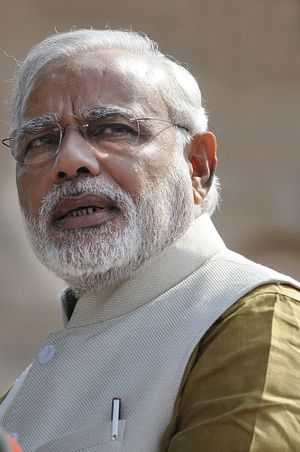On Wednesday, the Tehreek-e-Taliban Pakistan Jamaat-ul-Ahrar, a splinter group affiliated with the broader Pakistani Taliban, threatened to stage attacks against the Indian prime minister, Narendra Modi. In a statement, a spokesman for the group condemned Modi’s alleged complicity in Hindu-on-Muslim violence in his home state of Gujarat, noting that Modi was “the killer of hundreds of Muslims.” Speaking via Twitter, he added that the TTP would “take the revenge of innocent people of Kashmir amd Gugrat [sic].”
The spokesman, Ehsanullah Ehsan, spoke to Reuters via telephone where he elaborated on his group’s threats against the Indian government. “I have already conveyed it to Modi … that if our suicide bombers can carry out attacks on this side of the border, they can easily do it on other side of the border in India,” he said. “I told him that his hands are red with the blood of Kashmiri mujahideen (fighters) and innocent people of Gujarat for which he would have to pay the price,” he added.
The group’s threats to the Indian government and prime minister came shortly after it claimed attack for a deadly suicide attack in the Pakistani side of the village of Wagah — the site of the only official land border crossing between India and Pakistan. The choice of Wagah for that attack suggested that the group intended to threaten both India and the Pakistani government in one attack. The TTP spokesperson claimed that the Wagah bombing was retribution for the Pakistani military’s ongoing campaign against the Taliban in North Waziristan, known as Operation Zarb-e-Azb.
Following the Wagah attack, Modi immediately expressed his condolences to the the victims and condemned the attack. “Terror attack in Pakistan near Wagah Border is shocking. I strongly condemn such a dastardly act of terrorism,” he remarked via Twitter. Following the Wagah attack earlier this week, speculation abounded in India that the bomber’s target could have been the Indian side of the border. Given that India-Pakistan relations have been at their lowest point in over a decade in recent weeks, groups like the TTP and Jamaat-ul-Ahrar could be looking to foment additional crises between the two countries. India regularly contends that Pakistan does not adequately prevent militants and terrorists from attacking India.
Additionally, according to an anonymous Pakistani intelligence official who spoke to Reuters, the bomber was almost certainly intending to attack the Wagah flag lowering ceremony. “It appears the bomber wanted to target ground zero where Pakistan and India border officials stand together to perform the flag ceremony but he could not enter due to tight security on the last gate,” the official told Reuters. “Had he managed to reach the place, there would have been the worst scenario at both sides,” he added.
Given the recent declaration by Al Qaeda chief Ayman al-Zawahiri that the group would increase its activities in South Asia after the founding an official South Asia wing, it is unsurprising that the TTP and other groups with links to Al Qaeda are carrying out attacks on targets of both strategic and symbolic importance such as Wagah.

































